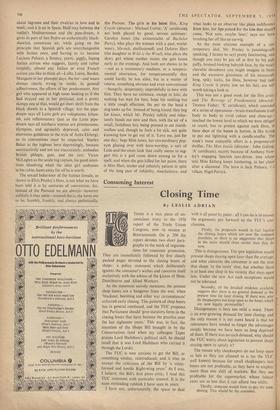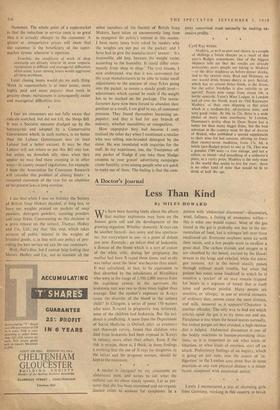Consuming Interest
Closing Time
By LESLIE ADRIAN
THERE is a nice of un- conscious irony in the 1958 report of the Trade Union Congress, now in session at Bournemouth. On p. 206 the report devotes two short para- graphs to work of organisa- tions for consumer protection. They are immediately followed by five closely packed pages devoted to the closing hours of shops : a policy statement which deliberately ignores the consumer's wishes and concerns itself exclusively with the whims of the Union of Shop, Distributive and Allied Workers. As the statement naively mentions, the present shop hours are a hangover from the war, when `blackout, bombing and other war circumstances' enforced early closing. This pattern of shop hours has in general continued, and the TUC proposes that Parliament should 'give statutory form to the closing hours that have become the practice over the last eighteeen years.' This was, in fact; the intention of the Shops Bill brought in by the Conservatives (and when my colleague Taper praises Lord Hailsham's political skill, he should recall that it was Lord Hailsham who carried it through the Lords). The TUC is now anxious to get the Bill, or something similar, reintroduced; and it tries to answer the criticisms of the Bill by 'a misin- formed and hostile Right-wing press.' As I was, I believe, the Bill's first press critic, I read this TUC statement with particular interest. It is the most misleading rubbish I have seen in years. I have not, unfortunately, the space to deal With it all point by point : all I can do is to answer the arguments put forward as the TUC's con- clusions. Firstly, the proposals would in fact legalise the closing hours which are now the common practices, so there is no suggestion that shops in the main should close earlier than they do now. This is disingenuous. The tiew legislation would prevent shops staying open later than the average: and what concerns the consumer is not the time that shops 'in the main' shut, but whether there is at least one shop in his vicinity that stays open late. Under the new Act such exceptions would not be tolerated.
Secondly, all the detailed evidence available suggests that there is no generaldemand at the present time for later closing. If there was, why do shopkeepers not keep open to the hours which are now legally permissible?
Disingenuous is here too mild a word. There is art ever-growing demand for later closing; and the only reason it is not more heard is that we consumers have tended to forget the advantages simply because we have been so. long deprived of them. If there was no such demand, why should the TUC worry about legislation to prevent shops staying open to satisfy it? The reason why shopkeepers do not keep open as late as they are allowed to is (as the TUC well knows) because for small shopkeepers late hours are not profitable, as they have to employ more than one shift of workers. But they are profitable for the supermarket, whose labour costs are so low that it can afford two shifts. Thirdly, someone would have to pay for later closing. This would be the customer. Nonsense. The whole point of a supermarket is that the reduction in service costs is so great that it is actually cheaper to the consumer. A glance at compafative prices will show that the customer is the beneficiary of the super- market system wherever it operates.
Fourthly, the conditions of work of shop assistants are alfeady inferior in some respects, recruitment is difficult and managerial difficulties often acute. Later closing hours would aggravate all these problems.
Later closing hours would do no such thing. Work in supermarkets is at once easier, more highly paid and more popular than work in grocery shops; recruitment is consequently easier and managerial difficulties less.
*
I fear we consumers are not fully aware that ridicule scotched, but did not kill, the Shops Bill. It was a Socialist measure dredged up by the bureaucrats and adopted by a Conservative Government which, in such matters, is no better than the Labour Government was (at least Labour had a better excuse). It may be that Labour will not return to put this Bill into law, but unless we demolish silly ideas when they appear we may find them creeping in in other ways—in county council regulations, for example. I hope the Association for Consumer Research will consider this problem of closing hours: a reasoned statement of the case for an abolition of the present laws is long overdue.
* * I see that while I was on holiday the Society of British Soap Makers decided, at long last, to have net weights printed on packets of soap powders, detergent powders, scouring powders and soap flakes. Commenting on this decision in a press release on the subject, Thomas Hedley and Co., Ltd., say that 'this step, which takes account of public interest in the weights of branded goods, is in line with our policy of pro- viding the best service we can for our customers.
Well, that's fine; but I cannot help feeling that Messrs. Hedley and Co., not to mention all the other members of the Society of British Soap Makers, have taken an uncommonly long time to recognise the public's interest in this matter. I have many times been asked by readers why the weights are not put on the packet; and I have had to give the manufacturers' answer : 'It's impossible, old boy, because the weight varies according to the humidity. It could differ enor- mously from shop to shop.' The real reason, I now understand, was that it was convenient for the soap manufacturers to be able to make small adjustments to the amount of soap flakes going into the packet, to ensure a steady profit level— adjustments which cannot be made if the weight has to be marked on the package. The manu- facturers have now been forced to abandon their position as a result, I am glad to say, of consumer pressure. They found themselves becoming un- popular; and that is bad for any branch of industry, whether monolithic or competitive.
How unpopular they. had become I only realised the other day when 1 mentioned a retailer who was selling non-branded detergent by the stone. He was inundated with inquiries for the stuff..In my experience, too, the 'Fourpence off any packet of Sludge if you take these Sludge coupons to your grocer.' advertising campaigns create hostility, even among people who are quick to make use of them. The feeling is that the corn- pany concerned must normally be making ex- cessive profits.
Cyril Ray writes: Madeira, as well as port and sherry, is a couple of shillings a bottle cheaper as a result of this year's Budget concessions. One of the biggest shippers tells me that the results are already noticeable; more people are taking to Madeira —to the drier madeiras as before-dinner drinks, and to the sweeter ones, Boal and Malmsey, as one would drink brown sherry or port. Sercial, which has an almost bitter finish, is the driest, but the softer Verdelho is also suitable as an aperitif. Prices now range from about 14s. a bottle upwards. Yates's Wine Lodges, in London and all over the North, stock an 'Old Rainwater Madeira' of their own shipping at this price which is a medium-dry, all-purpose wine, and very good value. At 16s. to 22s. there is a wide choice at many wine merchants. In London, Downman's pretty shop in Dean Street has a better list than many bigger firms, but the best selection in the country must be that of Averys of Bristol, who published a special supplement to their wine list fast autumn, offering no fewer than twenty-seven madeiras, from I7s. 6d. a bottle (pre-Budget price) to one at 75s. That was a genuine 1789 wine—a true vintage, and not a solera, or blend—and something of a collector's piece, at a rarity price. Madeira is the only wine in the world that seems to live for ever: there is no other kind of wine that would be fit to drink at half the age.



































 Previous page
Previous page